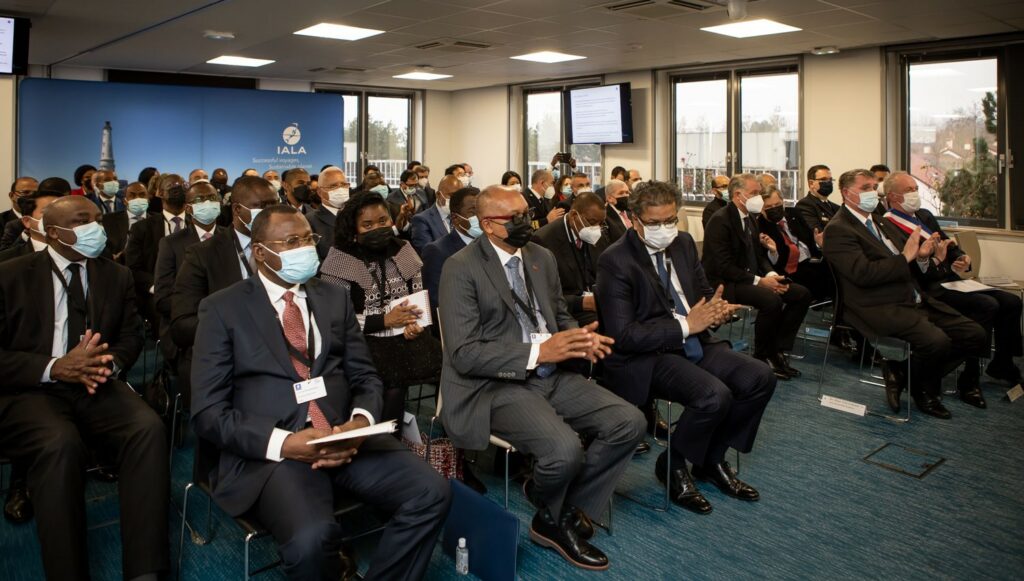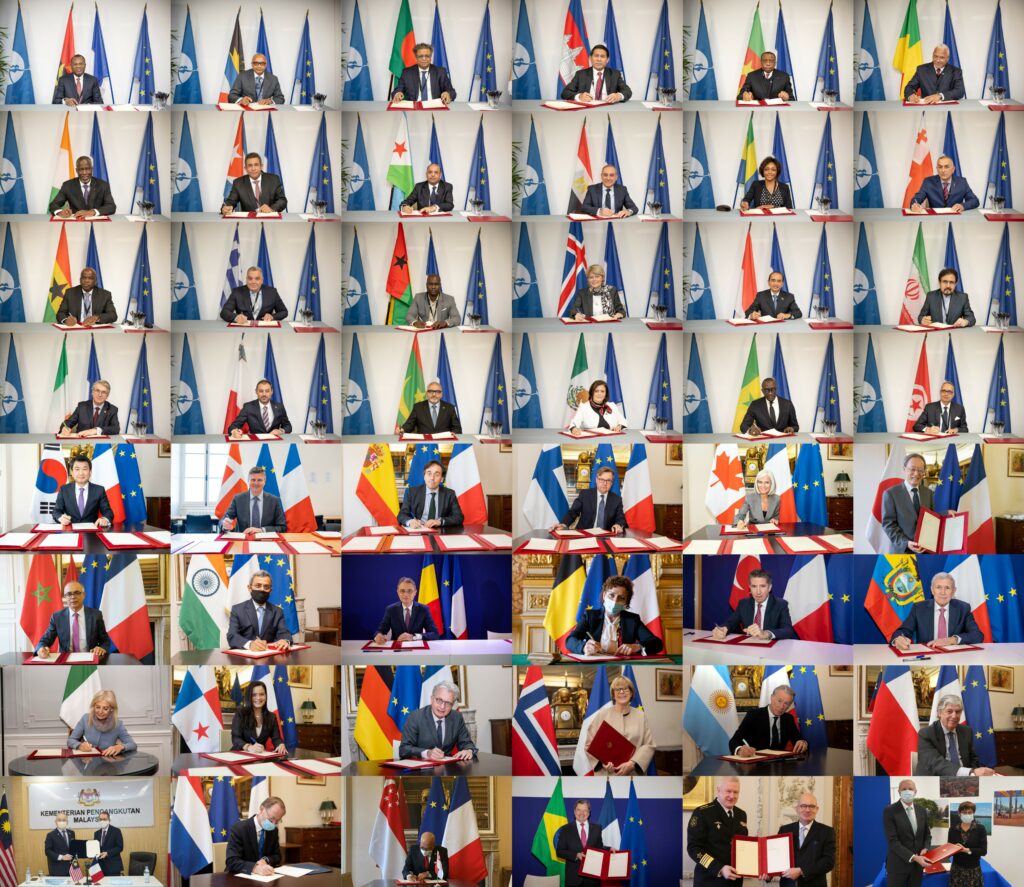IALA is on its way to Intergovernmental status
PRESS RELEASE
Saint-Germain-en-Laye, 26 January 2022
27 States signed the Convention on the International Organization for Marine Aids to Navigation at a signing ceremony which took place at the IALA headquarters in Saint Germain-en-Laye, near Paris, on 26 January 2022.
The ceremony was hosted by the Ministry for Europe and Foreign Affairs representing the Depositary, the government of France.
This ceremony marked the end of the one-year signature period which started on 27 January 2021 in Paris where France, as Depositary State, represented by Mrs. Annick Girardin, Minister of the sea, was the first State to sign the Convention.
All Member States of the United Nations, and in particular the other signatories of the Final Act of the 2020 Kuala Lumpur Conference, were invited to sign the Convention at the signing ceremony.
The countries that signed the Convention on 26 January 2022 were the following: Angola, Antigua and Barbuda, Bangladesh, Cambodia, Cameroun, Congo (Republic of), Côte d’Ivoire, Cuba, Djibouti, Egypt, Gabon, Georgia, Ghana, Greece, Guinea Bissau, Iceland, Indonesia, Iran, Ireland, Malta, Mauritania, Mexico, Senegal, Togo, Tunisia, United Arab Emirates and Vanuatu.
That brings the total number of signatures up to 51. Five States have also ratified or accepted the Convention.
From today, all Member States of the United Nations that have not signed the Convention may accede to the Convention, which will enter into force ‘on the ninetieth day after the date of deposit of the thirtieth instrument of ratification, acceptance, approval or accession.’
Mr. Francis Zachariae, IALA Secretary-General stated in his welcome that: This important progress reflects the respect that the new organization will have based on the many years of IALA’s growth, maturity and excellence. IALA will soon be able to contribute even more to safety of navigation worldwide, protection of the maritime environment and good ocean governance.
More information about the IGO process can be found on IALA website https://www.iala-aism.org/the-igo-project/
ADDITIONAL INFORMATION
Adoption of the text and signing of the Convention
The Convention on the International Organization for Marine Aids to Navigation was adopted at a Diplomatic Conference in Kuala Lumpur in February 2020 after three preparatory conferences in Istanbul in March 2019, in Marrakech in February 2018 and in Paris in April 2017. The development of a set of new General Regulations, including financial regulations, is well advanced and the final draft is envisaged to be agreed at the first General Assembly of the new intergovernmental organization (IGO). Meanwhile, the draft Headquarters Agreement is under development and will be finalized in cooperation with the Ministry for Europe and Foreign Affairs of France.
The Convention was signed 27th January 2021 by France, represented by Mrs. Annick Girardin, Minister for Marine Affairs. France, being the host Country and the depositary State, was the first to sign the Convention.
This event marked the opening for signature of the Convention for a period of one year. All Member States of the United Nations, and in particular the other signatories of the Final Act of the Kuala Lumpur Conference, were invited to sign the Convention at the Protocol of the Ministry for Europe and Foreign Affairs, and then to proceed to its ratification.
At the signing ceremony in Paris on 26 January 2022, 26 states signed the Convention. As of today, 50 States have signed the Convention and five States have ratified or accepted the Convention.
The certified versions of the Convention in the official languages of the organization, Arabic, Chinese, English, French, Russian and Spanish, can be found on the IALA web site: https://www.iala-aism.org/the-igo-project/
Smooth transition
The Convention contains robust arrangements for a smooth transition. These will ensure that the activities of IALA’s organs and its technical work in the area of Marine Aids to Navigation (AtoN) will continue uninterrupted and that its responsibilities towards the maritime community will be undiminished and maintained with the customary high level of commitment and expertise.
The change of status will mark a major milestone in the life of IALA. However, it will not, in any way, change the principal aim of IALA, which is, as stated in its present Constitution, “to foster the safe, economic and efficient movement of vessels”. Under the new Convention, IALA will also remain a consultative technical organization.
Strengthening international cooperation
IALA has worked in close partnership with other international organizations for decades and wishes this collaboration to continue and grow. Elevating the status of IALA to that of an IGO will make it a peer to organizations such as the International Maritime Organization, the International Telecommunication Union, the World Meteorological Organization and the International Hydrographic Organization, thereby strengthening existing cooperation. Furthermore, it will allow for a broader participation in IALA by States, at government level. This will assist IALA’s aim to promote the greatest possible uniformity in AtoN, in the spirit of the SOLAS Convention.
Further in this regard, IALA is mindful of the United Nations Convention on the Law of the Sea (UNCLOS), which, under Article 266, requires States that are Parties to UNCLOS to cooperate “through competent international organizations” to promote the development and transfer of marine technology. IALA is already fully engaged with, and will continue to be dedicated to, promotion of technical cooperation on all matters related to the development and transfer of expertise and technology in relation to AtoN. In this context, it is committed to keeping pace with emerging technologies, as appropriate, and working closely together with its Industrial members around the world, as well as with national government agencies and AtoN authorities and other international and intergovernmental organizations.
The objectives and activities of IALA as an IGO will continue to be complementary to those of its peer IGOs. By working together with partner IGOs, with the respective mandate, role, and responsibilities of each transparent, mutually supportive, and commonly accepted, work will become more effective through better coordination and greater integration of standards. Any overlap or duplication would also be easier to avoid, and the resulting creation of synergies would optimize available resources in the interests of the efficient movement of vessels, expeditious shipping traffic, maritime safety and protection of the environment.
The Convention
The Convention draws on the principles and provisions of the present IALA Constitution and those of the conventions of sister organizations. With respect to the position of Industrial members, the Convention follows the approach of the Convention of the World Tourism Organization (UNTWO), which designates companies involved in the business of promoting tourism as Affiliate members to ensure their inclusion as an important category of its membership. The existing Industrial members of IALA will thus become Affiliate members of IALA as an IGO and this will ensure the continued, strong cohesion between AtoN authorities and providers that has always been important for the work of IALA.
IGO status will best support the aims and activities of IALA into the future. It will benefit the Member States and members, other International Organizations and their Member States and members, as well as the shipping industry. This will be achieved by continuous improvement and enhanced harmonization of AtoN and related services to the benefit of safety of navigation, efficiency of shipping traffic and protection of the environment. The Convention provides for a fit-for-purpose international legal framework that ensures transparency and good governance, strengthens the position of IALA to work in close collaboration with Governments and other IGOs, and fosters its technical and consultative work as the leading international expert body concerned with AtoN and related services.
Notes for Editors are provided below.
***
Origin and membership of IALA
The International Association of Marine Aids to Navigation and Lighthouse Authorities (IALA) was established in Paris in 1957 as a consultative, technical and not-for-profit organization with the aim to share maritime knowledge and work together for safe navigation.
Guided by the motto “Successful voyages, Sustainable Planet”, its mission is to ensure the provision of effective and harmonized marine aids to navigation (AtoN) systems and services worldwide. Its membership embraces both national competent authorities (AtoN providers) and stakeholders from the equipment industry (AtoN suppliers), such as AtoN manufacturers and distributors, and technical advisory services, scientific agencies and other concerned entities.
IALA and best practice
The IALA Maritime Buoyage System is universally recognized and implemented. When it was established in 1980, it superseded the approximately thirty disparate systems that existed around the world in the 1970s. It is referenced in the International Convention for the Safety of Life at Sea (SOLAS regulation V/13).
The IALA NAVGUIDE is the bible on AtoN design and operation. The digital version of the latest edition is available, free of charge, from the IALA website www.iala-aism.org.
The IALA recommendations and guidelines are internationally recognized and widely followed and are free to download from the IALA website. They are not mandatory in the legal sense, but they do represent generally accepted best practice. They are developed and maintained by the four IALA committees, which each cover a particular technical domain – ranging from AtoN design, engineering, sustainability and management to vessel traffic services, e-navigation, communications and shore-based maritime information services.
In June 2018, the XIIIth IALA General Assembly, held in Incheon, Republic of Korea, approved a first set of seven IALA standards. These are a vital aspect of the IALA Strategic Goal that coastal States should contribute to a harmonised global network of AtoN by 2026. They are not legally binding. However, they provide high-level, overarching references to the principal technical domains covered by the recommendations and guidelines and IALA will encourage their implementation through capacity-building and training support.
The committees are the ‘powerhouse’ of IALA and benefit greatly from the high-quality input of IALA’s Industrial members. The cohesion between AtoN suppliers and AtoN providers is a unique feature of IALA and invaluable for the continued relevance of its technical work.
The IALA World-Wide Academy
The IALA World-Wide Academy (WWA) became operational in January 2012. Its principal aim is to engage in capacity building and training for the establishment of AtoN networks in targeted developing countries who need cadres of competent personnel to support the development of their maritime economy. Furthermore, as coastal State signatories to the International Convention for the Safety Of Life At Sea, they are required to meet their legal obligations to provide the AtoN that seafarers need.
The WWA has been an undeniable success story in the short period of its existence – as demonstrated by the reduction in targeted coastal States. To date, the Academy cooperates with many accredited training organizations around the world both for AtoN and VTS training in key maritime regions, and Africa is now fast becoming a high priority. There are also promising opportunities in long-distance learning and the Academy has developed a digital platform for this purpose. This will also help to accelerate the pace of training worldwide in response to continued growing demand.
IALA and international cooperation
While IALA is not part of the United Nations (UN) system, it has been cooperating closely with some UN entities and other international organizations for decades and is committed to the UN’s 2030 Sustainable Development Agenda.
International cooperation is ever-more important in an era of globalization, rapid technological changes, growing demand for digital connectivity, mounting environmental pressures, and increased public expectations with regard to sound ocean governance. Working together as an equal partner with other IGOs – each with their respective mandates, roles and responsibilities – will bring greater opportunities in terms of effective coordination, increased harmonization and integration of standards, and better use of available resources, in accordance with the UN policy on “Delivering as One”.
It is also against the background of these challenging realities of today’s world that the XIIth IALA General Assembly held in A Coruña, Spain in 2014 adopted a resolution stating its firm belief that IGO status will best facilitate IALA’s aims in the twenty-first century and determine that the new status should be achieved as soon as possible through the development of an international convention.
___
CONTACT:
contact@iala-aism.org
PHOTOS AND CAPTIONS:

Francis ZACHARIAE, IALA Secretary-General, has led the IGO Action Project since his appointment in February 2015



Photos from the signing ceremony on 26 January 2022. More photos can be found on the IGO webpage.


